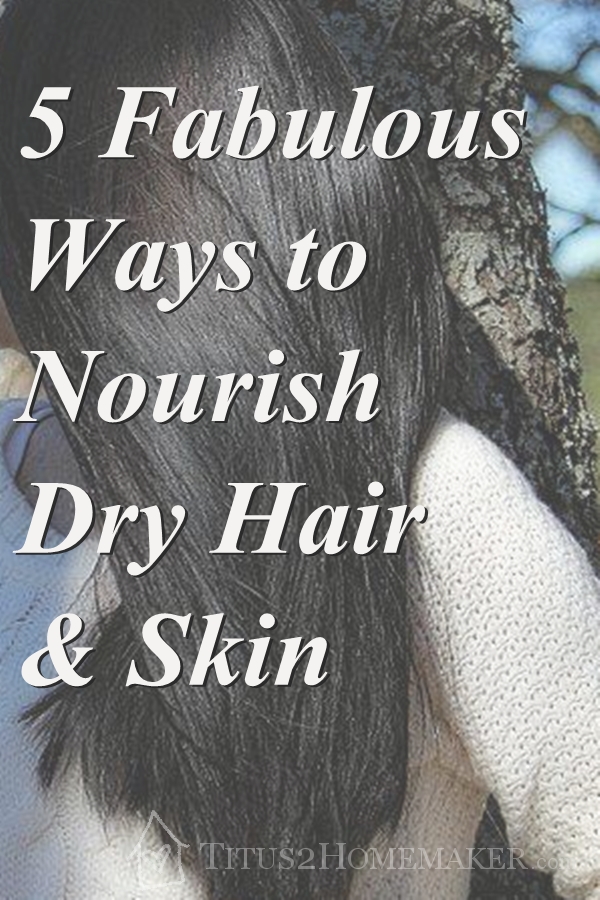Okay, the title of this post isn’t 100% precise, because some of these things are actually ways to avoid depleting the skin/hair of moisture in the first place. Let’s start with prevention and then we’ll slide into “treatment.”
1. Avoid chlorine.
Chlorine is very drying. In the winter our skin tends to be dry enough, without adding to it! If you have city water and can’t afford a whole-house filter, you can use a shower filter like this one and/or a bathtub filter like this one.
2. Don’t shower too often.
I know; you’re probably thinking, “How can I shower too often?!” Well, every time you shower, you’re washing the natural oils off your skin (and out of your hair) and it has to “start over.” Most people can probably shower every other day and do just fine. Depending on your circumstances, you may even be able to go three days (that’s especially true for little ones who don’t yet sweat quite like their older family members).
But maybe you legitimately need to shower more often than that. Maybe you exercise daily and get gross; you get traditionally dirty on a regular basis; you sweat more than average — or have some other reason. In this case, you could consider a couple of options for compromise.
You can shower more frequently, but not wash your hair more frequently. This is, obviously, not any easier on your skin, but it does help your hair. (By the way, if your hair gets oily so quickly you think you’d never be able to skip a day of shampooing, you might actually consider trying this for a month or two. Sometimes the hair is only so oily because it has adjusted to the frequent shampooing, and if you shampoo less frequently for a while, it will adjust back.)
You can also shower more frequently, but only use soap on the smelly bits. Do your legs and arms really need to be soaped up as regularly as, say, your underarms?
3. Use oil internally.
To some degree, our skin dries out from the inside. Sometimes this is because we’re not taking in enough fluids. Sometimes it’s because we’re not taking in enough fats (or enough of the right kinds of fats). If you’re getting enough to drink, but you still seem dry, check your intake of fat (and of Omega-3’s).
4. Use oil externally.
If you’re keeping up with the first three things and you’re still dry, it’s probably time to tackle the problem from the outside. Lots of oils can be used topically on dry skin, but jojoba (pronounced ho-HO-buh) and argan oils are especially good, because they absorb quickly and leave you feeling less oily.
Sometimes, though, you don’t want a light oil that absorbs quickly; you want some staying power. In that case, look for something (or make something) that includes shea or cocoa butter and/or beeswax to keep it on the skin for longer.
5. Add essential oils to your oils (or skin/hair care products) for an extra boost.
Want to add an extra boost to the oils you’re using on your hair or skin? Try adding essential oils. Simply Aroma has a relatively new blend (Lush) that’s formulated especially for hair.
Individual essential oils that may be beneficial for dry skin or hair include: lavender, sandalwood, rosemary, geranium, cedarwood, and tea tree.
(Lavender, rosemary, cedarwood, and tea tree have a balancing/normalizing effect, so they’re okay for oily skin/hair, too.)
I hear that clary sage, vetiver, and ylang ylang are also beneficial for dry skin. I haven’t seen them indicated specifically for dry hair, but I would imagine that if they’re good for skin, they’re probably good for hair, too.
Sweet orange is also a hydrating essential oil. Frankincense & myrrh are said to be healing/soothing to dry, chapped skin.
(I like to add lavender and frankincense to some fatty — but liquid — oils like avocado oil (be warned: it’s green!) and fractionated coconut oil, and put it in a roller bottle. When my hands get really chapped, this lets me apply it to the backs of my hands without ending up with oily palms. Usually 2-3 applications over a couple of days will take my hands from cracked and bleeding back to completely normal.)

Leave a Reply